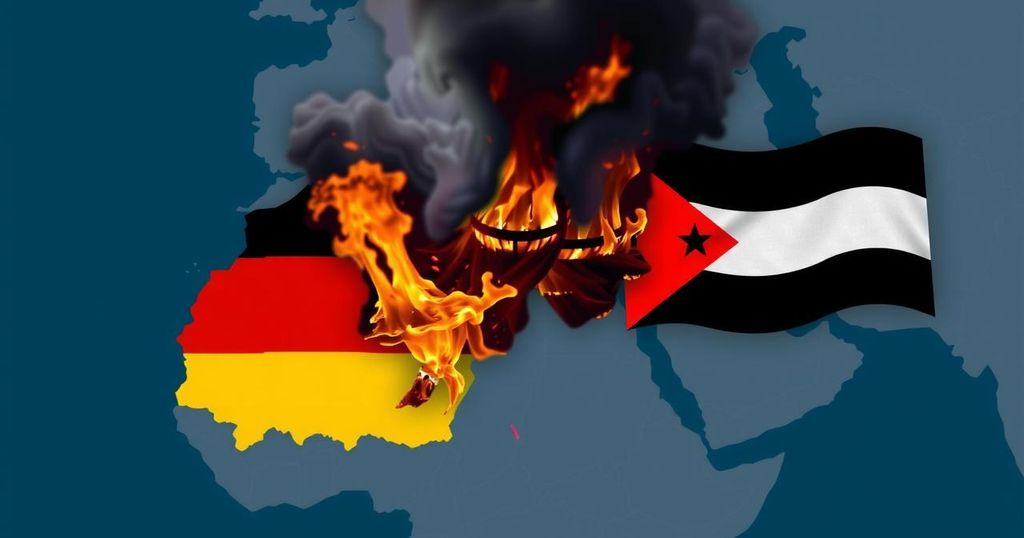Evaluating Complicity and Historical Legacies in the Context of Israeli Military Actions.

Since October 2023, Israel has carried out military operations in Gaza, resulting in significant civilian casualties, inciting protests across Europe advocating for an end to the violence and an arms embargo against Israel. German officials’ comments justifying civilian casualties have provoked backlash and raised concerns about Germany’s complicity in violence reminiscent of historical genocides. The international legal implications, with the ICJ involved, further complicate the ongoing humanitarian crisis.
Tensions continue to rise as Israel and its Western allies face mounting accusations regarding their military actions in Gaza and Lebanon. Since the onset of the current conflict in Gaza in October 2023, Israel has conducted extensive military operations, resulting in the deaths of over 42,600 Palestinians, including approximately 17,000 children. Amidst this violence, Israeli Prime Minister Benjamin Netanyahu has targeted high-ranking Hamas and Hezbollah leaders, asserting that their demise is a necessary step towards achieving peace. Demonstrations against the violence have proliferated across Europe, as citizens call for accountability and an end to these hostilities, leading to confrontations with German police in Berlin who sought to disperse large gatherings condemning the actions taken by Israel. European protests have intensified as activists demand an arms embargo against Israel, criticizing their own governments for ongoing military support. Notably, German officials have elicited significant backlash for suggesting that civilian casualties can be justified under the pretext of self-defense. Foreign Minister Annalena Baerbock’s remarks on targeting civilians in Gaza, which she framed as necessary to combat terrorism, prompted widespread condemnation, particularly from Palestinian groups and international observers. Activists argue that such justifications reveal a troubling legacy, echoing Germany’s own historical atrocities in Namibia, where genocide was perpetrated during colonial times. Critics assert that Germany’s current support of Israel places it again on the wrong side of history, aligning with actions perceived as genocidal. Meanwhile, the International Court of Justice (ICJ) is engaged in ongoing deliberations surrounding Israel’s purported genocidal actions and has issued arrest warrants against key Israeli leaders for war crimes. The ramifications of these events extend beyond immediate humanitarian concerns, as they implicate broader geopolitical dynamics and the ethical responsibilities of nations in conflicts characterized by profound loss of life and human suffering.
In the context of escalating violence in Gaza and Lebanon, the geopolitical landscape has been marked by tensions between Israel and regional resistance movements, particularly Hamas and Hezbollah. The conflict has led to severe casualties, particularly among civilians, which has incited widespread international protest and condemnation. As protests unfold across Europe, they reflect a growing dissent against Israel’s military actions, with demonstrators urging their governments to withdraw support for Israeli operations in Gaza. Germany, with its sensitive historical context of genocide during World War II and more recently in Namibia, faces scrutiny regarding its armaments support for Israel amidst allegations of complicity in these violent assertions. The statements from German officials, particularly those suggesting the acceptability of civilian casualties under military operations, have further inflamed public sentiment, echoing broader concerns about the moral obligations of nations engaged in complex conflicts.
The actions of Israel in Gaza and Lebanon, compounded by the responses of Western allies such as Germany, have rendered the situation increasingly untenable. Amidst rising death tolls and widespread protests, the international community grapples with questions of accountability, complicity, and moral responsibility. Germany’s historical legacy and current foreign policy decisions are once again scrutinized as accusations of genocide resonate within a global discourse that calls for urgent action and intervention to uphold human rights and dignity.
Original Source: www.tehrantimes.com






